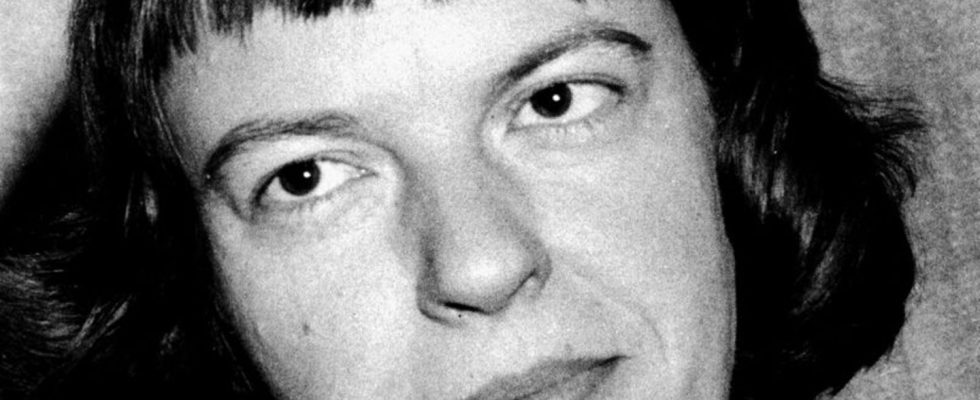It is the 50th anniversary of the death of Ingeborg Bachmann, the famous writer. She wrote about the war, chain-smoked and probably liked wearing sequined dresses. Why it’s worth reading her texts today.
Once the police rang a bell for the writer Ingeborg Bachmann. The reason: Noise in her apartment at night, the neighbors complained. At first the poet doesn’t understand what kind of noise is meant. Until she realizes: it’s all about typewriter clattering.
She explains to the officers that she can only work at night. They ask what their job is, and Bachmann explains. She writes poems. The police reacted by shaking their heads: “Such little poems and so much noise!”
At least that’s how Bachmann’s friend Uwe Johnson remembers an episode from Ingeborg Bachmann’s everyday life in Rome in a story. It has now been 50 years since she died. Yes, Ingeborg Bachmann (1926-1973) wrote poems. And stories, radio plays, essays and a novel. Today, their texts are among the most important literature of the 20th century.
It’s still worth reading Bachmann. The Austrian discussed the difficulty of asserting herself as a woman in many areas of our male-dominated society. She talks about the effects that war has on people. And of the hopes, fears and fulfillment that lie in love.
Bachmann as a literary star
Bachmann was a pioneer with her feminist texts. Some things, such as her 1971 novel “Malina,” would still be groundbreaking if they were published today. Her poems were already making “noise” back then. However, in a completely different way – she became very famous. Bachmann was the first poet on the cover of “Spiegel” in 1954. She then became a literary star, received prizes and lectured at the university.
From her letters and several biographies one can guess: Bachmann was a person full of contradictions. The author, who did her doctorate on the philosopher Martin Heidegger, liked to delve deeper into intellectual questions and was known as a chain smoker. At the same time she liked nightlife, dancing, elegant dresses. She was friends with many famous people. For example with Hans Magnus Enzensberger, who once spoke to the author Ina Hartwig about Bachmann. In her biography she summarizes the conversation and quotes: “The overall impression remains: “Ingeborg Bachmann in sequin dresses.””
Social and interpersonal violence
The contrast to her texts couldn’t be greater. They are about political and interpersonal violence. Long before it became an issue in Austria, she discussed the continued effects of fascism after the end of the war. “Malina” is about that. In it, a female self tries to speak – and in order to do so she has to go through terrible nightmares shaped by war and patriarchy in a kind of trauma therapy.
Bachmann was born in Klagenfurt. At the age of 17, she lived alone in her parents’ house in the middle of World War II. Bachmann’s mother moved to the country with her two younger siblings in 1944. Bachmann stayed behind to take her high school diploma.
Her neighbors die in a bomb attack. She decides not to go to the bunker in the future. “The thought of possibly perishing there with everyone like a herd of cattle is horrifying to me. At least in the garden. At least in the sun,” she writes in her “War Diary.”
In search of language and love
After 1945 the German language is that of the perpetrators. Like other writers, Bachmann is looking for ways to reflect on this and to re-acquire her native language. Her brother Heinz Bachmann tells dpa: “One of my sister’s important quotes was: No new world without a new language. That is still incredibly relevant.”
Language creates reality: This is a common argument today from people who advocate for gender-equitable language. Bachmann advocated it over half a century ago. What would she think of such discussions, for example that certain words that are now considered problematic are changed in old works? Her brother says: “I don’t know. She would probably see it as positive. Precisely because she pushed for the language to change so that our relations could improve. That was an important concern for her.”
And Bachmann actually explored new ways of telling stories. Detached from narrative conventions, she found her own unique language melody: musical, sometimes hastily stringing the words together, as if searching for the right formulation. In her poems she created unprecedented images. “Your hat lifts itself quietly, greets you, floats in the wind, your uncovered head has caught the clouds, your heart has other things to do, your mouth incorporates new languages,” begins her poem “Explain to me, love”.
Relationships with Paul Celan and Max Frisch
In her texts, Bachmann countered the memories dominated by violence with utopian ideas of love and freedom. She also pursued this in real life. Bachmann was not only in a relationship with the poet Paul Celan, but also the writer Max Frisch. Both relationships, as the correspondence shows, did not end well. Frisch, who was considered extremely jealous, couldn’t do anything with his partner’s freedom-loving nature. After the separation, he incorporated details of their relationship into his works, which Bachmann saw as a betrayal. Margarethe von Trotta’s film “Ingeborg Bachmann – Journey into the Desert”, which will be released in cinemas on October 19th, also talks about the shock that the separation caused her.
At times the writer became addicted to alcohol and tranquilizers. The pills are so strong that one day she probably falls asleep with a lit cigarette. She was taken to hospital with severe burn injuries and died there a few days later.
Today, Bachmann is often interpreted as a capricious, dark author. This does not apply to her brother, who is 13 years younger than her and who had a close relationship with her. What does he remember today? “It’s the joy, the storytelling, her laughter that has stayed with me and will always stay with me.”

